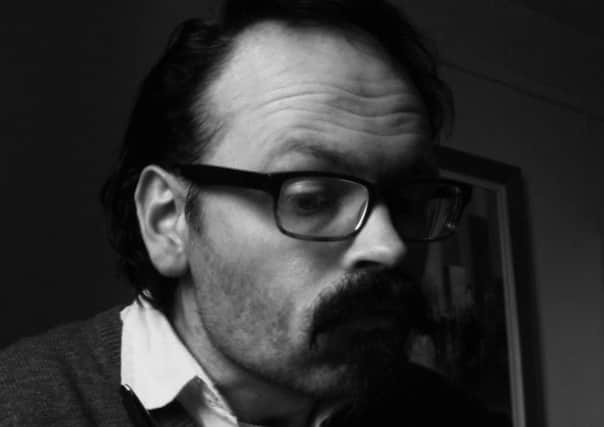JO Morgan on his epic poem At Maldon


Somewhere near the purer end of writing, where you just do it for its own sake and not your ego’s, and you don’t give a damn about fame or money, is where you can find the poet JO Morgan. Alternatively, you can head south on the A7 from Edinburgh for just over 20 miles and turn left.
I’d wanted to interview Morgan ever since he won the Aldeburgh Poetry Prize for the best first collection in Britain five years ago. I was told that he was a bit of a recluse and wouldn’t agree to an interview, though he sounded pleasant enough when I finally did get to speak to him. All the same, when I asked where he lived, he was intriguingly diffident. “You can put that I live somewhere in the south-west of England,” he told me.
Advertisement
Hide AdThat’s probably where I would have left it had I not then read his poetry. His debut, Natural Mechanical, was welcomed with a torrent of praise from the likes of Simon Armitage and Andrew Motion. A book-length poem about a friend’s childhood on Skye, it cut free from that self-regarding, almost priestly language that poetry sometimes seems to reserve to itself. Instead, it had what Robert Frost once called “the sound of sense” – the rhythms of natural, as opposed to deliberately poetic, language – and was every bit a wide-ranging and natural as its subject, a dyslexic boy called Rocky who got his education from the world around him.
His latest, At Maldon, is something else again. If I told you that it was a long poem about a battle on the Essex coast between the Anglo-Saxons and the Vikings in 991AD, you probably wouldn’t be interested, and I wouldn’t blame you.
“I don’t think I’ve ever read a poem as quickly,” I tell him when we finally meet, realising as soon as the words have left my mouth, it might not sound like the compliment I had intended. What I meant to say was that I was surprised how much I loved it given that university put me off Old English for life (At Maldon is a reimagining of “The Battle of Maldon”, one of the oldest poems in the language) and that I was never a fan of epic poetry in the first place.
Maldon was a lost battle in every sense – insignificant in history, half of it lost from the Anglo-Saxon poem itself, and a defeat for the home side. Yet Morgan makes it a thing of wonder, and – yes – a page-turner too.
We meet at the cottage he rents in the Borders, with a view over Gala Water. He is 36, has been forced through illness to take a succession of rather undemanding jobs since leaving Edinburgh University, and though he leads a rather ascetic life (“I find it quite easy to get by on £300 a month”) he is hardly a recluse.
In the photo he has supplied (he did request that I didn’t being a photographer), he is cutting up leather for book-binding. This is clearly something that fascinates him – small rolls of garishly coloured leather offcuts lie next to a guitar, mandolin and ukelele in his darkened living room.
Advertisement
Hide AdIt’s at the root of his poetry too. Natural Mechanical started with him encouraging Iain Seoras Rockliffe, a neighbour in the Highlands, to write his memoirs. When that didn’t happen, “I started thinking it through. If I were writing his stories, how would I do it? I decided that I’d want it to be fairly bare, with just enough information that people could recreate all those childhood scenes in their own head. And it would work best as poetry, though I knew that would mean hardly anyone would ever read it.”
At first, thanks to the bookbinding, his poetry started out as gifts to friends.
Advertisement
Hide AdAt Maldon began that way, with him working through the Old English poem intending to write a modern version. But again, he started thinking how he would like tell the story, how he would drop the unrealistic mid-battle speeches, and wherever possible “bring it away from men hitting each other”.
He’d make some of the characters sound modern – the Vikings, for example, sound like practised Eighties asset-strippers, yet keep some of the sounds from the Old English, while avoiding pastiche.
His main problem with the poem was, he says, how to open it up. “I was listening to a religious programme on the radio at the time and the answer came as a bit of a joke in my head. ‘What would Jesus do?’ I asked myself. ‘And then I thought – parables!’
“So what realised I’d do would have the poem’s narrator saying ‘It’s like this’ and then give a long simile and then having another one in which in effect he is saying ‘No, it’s not completely like that, it’s more like this ...’
“It’s as if the poem is saying ‘We don’t really know what this battle was like and yet we kind of know.’ You can never know exactly, but if you can get that shape in your head, it is almost as if you can feel you know what it was like without knowing exactly how to describe it. Yet you are using words to describe that feeling that you can’t describe in words. Does that make any sense?”
And JO Morgan throws back his head and laughs.
JO Morgan will be reading from At Maldon a week today at 2.15pm, when he will be appearing with Tomica Bajsic at St John’s Undercroft, South Street, St Andrews as part of the StAnza poetry festival. Tickets £3.50 from the Byre Theatre from Tuesday and www.onfife.com. See also www.stanzapoetry.org for full details of the 100 events on the festival programme.